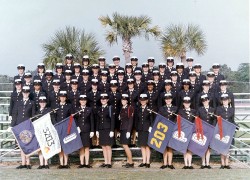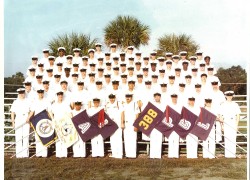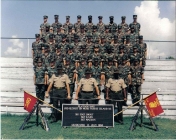Military police perform assigned military law enforcement duties to uphold the criminal justice system, maintain good order and discipline, and support the commander's law enforcement requirements in peacetime and combat operations. Typical duties include foot and motorized patrol, control of pedestrian and vehicular traffic, crime prevention/physical security, desk sergeant, communications dispatcher, squad leader, operations sergeant, platoon sergeant, and provost sergeant billets. MOS 5811 is very demanding in that the military police are confronted with every form of violation and criminal liability, misdemeanor through felony.
USMC
A military working dog (MWD) handler is a military policeman who is additionally trained to properly employ a military working dog on or off lease to conduct searches of open areas, buildings, vehicles, etc. for detection of explosives or illegal drugs, locating lost or wanted persons by scouting, and locating missing friendly force personnel or enemy combatants by tracking.
An accident investigator is a military policeman who is additionally trained in the enforcement of traffic laws, regulations and orders. Furthermore, the accident investigator investigates and reports traffic accidents; assists in accident prevention and vehicle safety programs; and conducts traffic control studies to determine present and future needs concerning traffic control and associated traffic programs aboard an installation.
A physical security specialist is a military policeman additionally trained to give the installation commander the ability to conduct risk/vulnerability assessments, analyze crime, and recommend appropriate courses of action to eliminate conditions conducive to terrorism, espionage, sabotage, wrongful destruction, malicious damage, theft, and pilferage. Asset protection and loss prevention can be accomplished through all these, but not limited to a physical security program, electronic security system program, and a loss prevention program.
A special reaction team is comprised of military police personnel trained to give an installation commander the ability to counter or contain a special threat situation surpassing normal law enforcement capabilities. All team members should be cross-trained in all team duties. As a minimum, the special reaction team must be capable of isolating a crisis scene, providing proficient marksmanship support, conducting tactical movement and building entry, and clearing of buildings in a variety of light and weather conditions.
The duties of the MPI require the assignment of mature and intelligent individuals responsible for investigating criminal violations of the Uniform Code of Military Justice (UCMJ) in matters of interest to the Armed Forces of the United States. A wide degree of latitude is afforded MPIs in support of the commander's obligation to the criminal justice system. Typical duties include conducting criminal investigations, covert operations, personal protective services, crisis management and negotiations, laboratory examinations, and liaison with other military and civil law enforcement agencies. MPI support both installation and Marine Air Ground Task Force commanders.
Criminal investigation division agents perform criminal investigative duties while operationally assigned to the Criminal Investigation Division and Naval Criminal Investigative Service (NCIS). CID agents conduct all felony general criminal investigations falling within the jurisdictional purview of CID and NCIS, provide technical guidance and supervision to junior CID agents and apprentice investigators, conduct covert operations, personal protective services, hostage negotiations, polygraph examinations, laboratory examinations, and liaison with other senior military, civil and Federal law enforcement agencies. CID agents support both installation and Marine Air Ground Task Force commanders.
- FIELD 58, MILITARY POLICE AND CORRECTIONS
- Hits: 5636
MOS 5822, Forensic Psycho-Physiologist (Polygraph Examiner)
Psycho-physiologists (Polygraph examiners) perform the full range of criminal investigative duties prescribed for and are operationally assigned to the Naval Criminal Investigative Service (NCIS).
Privacy Policy | Terms of Service | Sitemap
(C) 2009-2021 The Military Yearbook Project
Contact: webmaster-(at)-militaryyearbookproject.org




